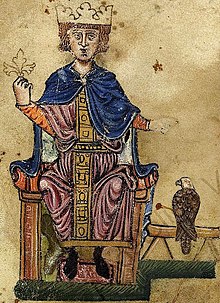Frederick II (HRR)
| Frederick II | |
|---|---|
 |
|
| Holy Roman Emperor; King of Italy | |
| Reign | 22 November 1220 – 13 December 1250 |
| Coronation | 22 November 1220 (Rome) |
| Predecessor | Otto IV |
| Successor | Conrad IV |
|
King of Germany formally King of the Romans |
|
| Reign | 1212–1220 |
| Coronation | 9 December 1212 (Mainz) 25 July 1215 (Aachen) |
| Predecessor | Otto IV |
| Successor | Henry (VII) |
| King of Sicily | |
| Reign | 1198–1250 |
| Coronation | 3 September 1198 (Palermo) |
| Predecessor | Henry VI |
| Successor | Conrad I |
| King of Jerusalem | |
| Reign | 1225–1228 |
| Coronation | 18 March 1229, Jerusalem |
| Predecessor | Yolande |
| Successor | Conrad II |
| Born |
26 December 1194 Iesi, Marche, Italy |
| Died | 13 December 1250 (aged 55) Castel Fiorentino, Apulia, Italy |
| Burial | Cathedral of Palermo |
| Spouse |
Constance of Aragon Yolande of Jerusalem Isabella of England Bianca Lancia (?) |
| Issue |
Henry VII of Germany Conrad IV of Germany Henry Otto, Governor of Sicily Margaret Constance (Anna) of Nicaea Manfred, King of Sicily Violante, Countess of Caserta Enzo of Sardinia |
| House | House of Hohenstaufen |
| Father | Henry VI, Holy Roman Emperor |
| Mother | Constance, Queen of Sicily |
| Religion | Roman Catholicism |
Frederick II (26 December 1194 – 13 December 1250) (German: Friedrich II, Italian: Federico II) was a Holy Roman Emperor and King of Sicily in the Middle Ages, a member of the House of Hohenstaufen. His political and cultural ambitions, based in Sicily and stretching through Italy to Germany, and even to Jerusalem, were enormous. However, his enemies, especially the popes, prevailed, and his dynasty collapsed soon after his death.
Viewing himself as a direct successor to the Roman emperors of antiquity, he was Emperor of the Romans from his papal coronation in 1220 until his death; he was also a claimant to the title of King of the Romans from 1212 and unopposed holder of that monarchy from 1215. As such, he was King of Germany, of Italy, and of Burgundy. At the age of three, he was crowned King of Sicily as a co-ruler with his mother, Constance of Hauteville, the daughter of Roger II of Sicily. His other royal title was King of Jerusalem by virtue of marriage and his connection with the Sixth Crusade.
He was frequently at war with the papacy, hemmed in between Frederick's lands in northern Italy and his Kingdom of Sicily (the Regno) to the south, and thus he was excommunicated four times and often vilified in pro-papal chronicles of the time and since. Pope Gregory IX went so far as to call him an Antichrist.
...
Wikipedia
